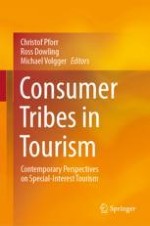2021 | OriginalPaper | Buchkapitel
14. Water-Sport Tribes in Multi-Sport Destinations: The Case of the Lake Garda, Italy
verfasst von : Anna Scuttari, Giulia Isetti, Philipp Corradini
Erschienen in: Consumer Tribes in Tourism
Verlag: Springer Singapore
Aktivieren Sie unsere intelligente Suche, um passende Fachinhalte oder Patente zu finden.
Wählen Sie Textabschnitte aus um mit Künstlicher Intelligenz passenden Patente zu finden. powered by
Markieren Sie Textabschnitte, um KI-gestützt weitere passende Inhalte zu finden. powered by
